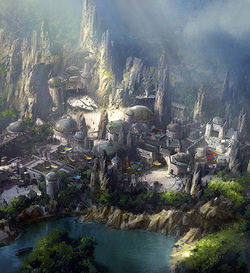
|
| Korada Monastery
|
|
Unknown, likely prior to 3,000 BBY
|
|
Aliso
|
|
Unknown for primary temple, B’oamarr Order for later monestary
|
|
110 meters (main temple spires)
|
|
|
|
|
Korada Monestary was the main base of operations for the now dissolved House Karness Muur on the surface of Aliso located about 330 km west-north-west from The Pinnacle. Once an ancient temple or palace of an unknown species, it more recently was used by the monks of the B’oamarr Order. It now serves as a formidable fortress and source of mystery.
History
Little is known for certain about the history of Korada Monastery, or even it’s original name, but it was immediately clear when it was located that it was ancient. While the exact date of construction is still being ascertained, it’s clear the structure dates back to at least 3,000 BBY. The main rocky spire into which a religious structure was built has roots with an as yet unknown alien species that inhabited Aliso several millennia before the Battle of Yavin. The later construction dates to about a millennium before the Battle of Yavin and bears striking similarities to known B’oamarr monastaries on Tatooine and Teth.
In early 35 ABY, Korada Monastery was selected as the primary base of operations for one of Clan Plagueis’ subsidiary houses, House Karness Murr. The Murrians made themselves at home in the fortress and operated out of it for several years, up until the House was dissolved in late 37 ABY. Although the leadership of Karness Murr held their position, becoming the summit of House Tyranus, they elected to transfer to a new headquarters. This would allow Hand of Dread to establish Tyranus as a power entirely separate from the influence of the previous House despite the identical leadership. The Dread Lord saw this as an opportunity to spread their influence further across Aliso, and so Korada Monastery was abandoned. Only a skeletal maintenance crew was left behind to keep the fort in proper working order should Plagueis have need of it in the future.
Physical Description
Korada Monastery is an approximately fourteen acre compound located on a sheltered cove along Aliso’s coast. The compound consists of a main temple structure that was carved into and out of a natural rock formation, a series of smaller outbuildings, and a number of smaller rock spires that have had a number of small rooms carved into them. The entire compound is a mix of the carved stone structures of the original inhabitants and the later B’oamarr construction, the two often intermingled and built on top of each other. In front of the temple, there sits a massive paved courtyard that has been put to use as a temporary landing field while a more permanent aerospace facility is constructed nearby.
The main temple itself has been fitted as a command center and residences. As much of the usable space belongs to the more recent B’oamarr construction, the decor is spartan and utilitarian, but spacious. Large open areas around the entryway to the main temple are being used as storage facilities and a small vehicle garage. Scans of the facility have detected a network of tunnels and caves deeper into the rock and underground, but these areas have yet to be cleared or fully explored. While some are still being restored, the rest of the monastery complex was being used as living facilities. The smaller rock spires, which seemed to house a number of smaller meditation chambers, were previously used to house slaves. They were easily converted to this purpose given their smaller rooms and limited means of ingress and egress.
The main structure has been ringed with anti aircraft laser cannons. Blaster turret emplacements have been placed in the outer towers and at the base of the main structure.In addition to the visible defenses, a series of hidden defenses including pop up blaster turrets amongst the rocks, sniper emplacements, remote observation posts on nearby outcroppings and islands, and sensor equipment in the water have been added. Hydroelectric generators provide the compound’s power, supplemented by a moderately sized aerogenerator array.